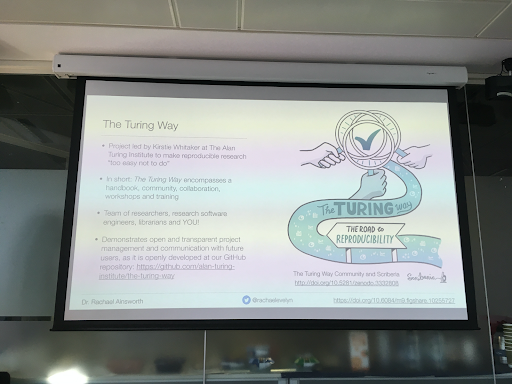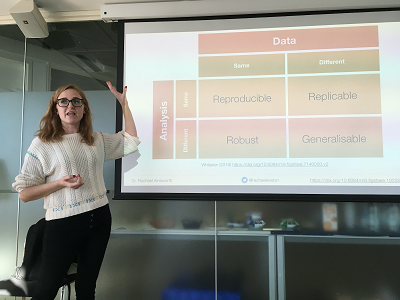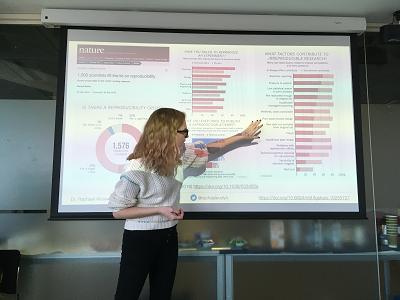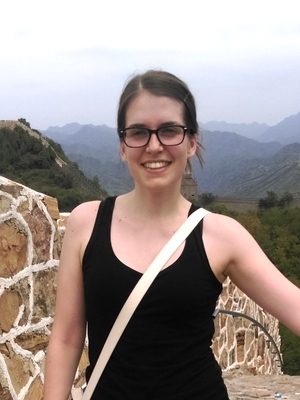Open Science at the University of Glasgow
Posted on 29 November 2019
Open Science at the University of Glasgow
 Photo by Frances Cooper
Photo by Frances CooperBy Frances Cooper, Software Sustainability Institute Fellow
Rachael Ainsworth, Software Community Manager for the Institute, visited the University of Glasgow on 15 November 2019 to talk about Open Science.
Rachael was hosted by Glasgow Women in Computing Science (GWiCS), a group which holds monthly meet-ups, information sessions and talks from leaders in academia and industry as well as providing a supportive network for new PhD students and early career researchers. Since founding GWiCS in 2018, we have grown to over 130 members and have two additional organisers Dr Ornela Dardha and Dr Lito Michala, both full-time lecturers at the University of Glasgow. GWiCS is open to all students and staff (female / non-binary / male) and we have recently opened our doors to other Glasgow universities as well.
We had around 20 attendees at this event from the Computer Science, Mathematics and Psychology fields and started off by networking over a buffet lunch. This was followed by Rachael’s fantastic talk on her career from Physics research to Open Science Advocate, an introduction to Open Science with compelling arguments on becoming more transparent in how we conduct our research, as well as lots of information on Open Science resources to make the transition easier.
 Rachael talks about the different standards we can look at within Open Science where Reproducibility should be the bare minimum (Photo by Frances Cooper)
Rachael talks about the different standards we can look at within Open Science where Reproducibility should be the bare minimum (Photo by Frances Cooper) Rachael discusses the different factors contributing to irreproducible research (Photo by Frances Cooper)
Rachael discusses the different factors contributing to irreproducible research (Photo by Frances Cooper)We learned about The Turing Way, an online handbook for reproducible data science that aims to make reproducibility in academic research ‘too easy not to do’. We also learned about Binder, an alternative to Docker and Singularity which allows you to turn any Git Repository into interactive Jupyter notebooks. There were many more resources described in the talk which can be found in the link below. Adding one or two elements of reproducibility for each new project is a great way to introduce better software practices without becoming overwhelmed. Rachael has kindly put her slides on FigShare under a CC BY 4.0 license so feel free to use these slides however you wish, even in your own presentations!
This topic really interested the audience and we had some great questions on topics such as Open Science vs Commercialisation of research, the Openness of Senior Academics to changing the way they work, and how getting scooped can be avoided while still keeping your research open.
I’ll leave you with a great quote from the talk. From Software Carpentry: "Your primary collaborator is yourself six months from now, and your past self doesn’t answer emails."

